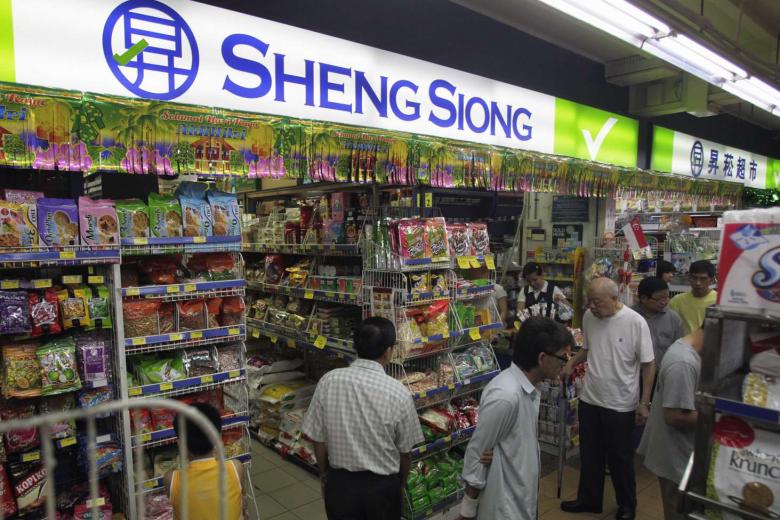SINGAPORE - Walk into any Sheng Siong store during Chinese New Year and the word to describe the sight is probably messy.
Messy because the goods of all kinds are stacked up in piles while a teeming mass of people pick and choose their wares.
Messiness is also a good sign for retailers like Sheng Siong because it is a sign of good business.
The latest financial results also show that the supermarket chain is indeed doing well, with a strong balance sheet to boost.
| Q3 2015 | Q3 2014 | |
|---|---|---|
| Revenue | $199.9 million | $186.3 million |
| Net profit | $14.5 million | $12.2 million |
| Cash and equivalents | $126 million | $130.5 million |
| Borrowings/debt | zero | zero |
| Net asset value | 15.2 cents | 15.2 cents |
1) Earnings up, revenues up, margins up
Net profit was up nearly 19 per cent to $14.5 million in the three months to Sept 30, compared with the same period last year.
The higher profit came on the back of stronger revenues, which went up 7.3 per cent to nearly $200 million.The company said that this was largely the result of contributions from five new stores.
Net profit margins edged up to 7.2 per cent from 6.5 per cent the previous year.
2) Strong balance sheet
The company has zero debt and $126 million in cash sitting pretty in its bank accounts.
The cash alone is worth about 10 per cent of the total market capitalisation of the company, or about 8 cents per share.
Not only that, free cash flow, according to Shareinvestor, was $20.6 million this quarter, a steady improvement over the past few quarters.
In the September to December period for instance, free cash flow then was estimated to be a negative $48 million, before turning positive over the year.
3) Cost pressures, uncertain economic outlook
For companies in the retail business, probably the most important thing to worry about is the performance of the economy. If the economy is humming along, and people get their pay raises and bonuses, goods are likely to be bought.
No difference for Sheng Siong - although some of the impact is mitigated by the fact that it is a supermarket that sells essential goods for the regular household. Even if a recession hit, people will still need to buy food and soap, although they could switch to cheaper brands or buy on discounts.
With the economy likely to plod along - growth is expected to be just between 2 per cent and 2.5 per cent - Sheng Siong is rightly worried.
"Competition in the supermarket industry is expected to remain keen and with the uncertain economic conditions, consumers would continue to be even more cost conscious," said the company.
The second challenge is costs. The supermarket is as much it is about what they sell to consumers as it is a logistics and manpower intensive business.
For logistics, the company has done a lot to streamlining their massive supply chain, by having a central distribution centre at Mandai.
But they are still exposed to fluctuations in the foreign exchange which could hurt them as much of their products are imported from overseas.
The other challenge is manpower, or the lack of it. No surprise then, that the company flagged manpower as an on-going concern.
"The restriction on the hiring of foreign workers is unlikely to be eased and the Group expects pressure on manpower cost to continue," said Sheng Siong
On this front, managing costs will be as important as raising the to p-line if they are to continue producing solid financial reports.
4) Expansion plans
For a retail chain like Sheng Siong, the key to business is probably expansion. And the key to that is opening more stores.
Currently it has 38 stories and it just signed a lease for a new store at Dawson Road, where there are brand new flats.
Said its chief executive Lim Hock Chee: "Going forward, we will stay focused on expanding our retail network across Singapore, particularly in areas where we do not have a presence while being mindful of the prevailing uncertainties in the business environment. Nurturing the growth of the new stores remains one of our key priorities as well."
But every store that it opens will be a more difficult one, especially in a crowded market in Singapore, with NTUC and Dairy Farm also competing for spots.
The good news is that it will likely to continue paying dividends to its shareholders because its business is relatively stable.
Last year, it gave about 3 cents per share in dividends. This year, in August, it announced an interim dividend of 1.8 cents.
Conclusion: Defensive stock with a strong balance sheet. It explains the solid rise of the stock price, more than doubling in three years since it was listed on the stock exchange.
But the business is likely to reach a plateau if it can't find new ways to open new stores or squeeze more sales out its current ones.
Thankfully, that point has been reach and there is still space to grow.


